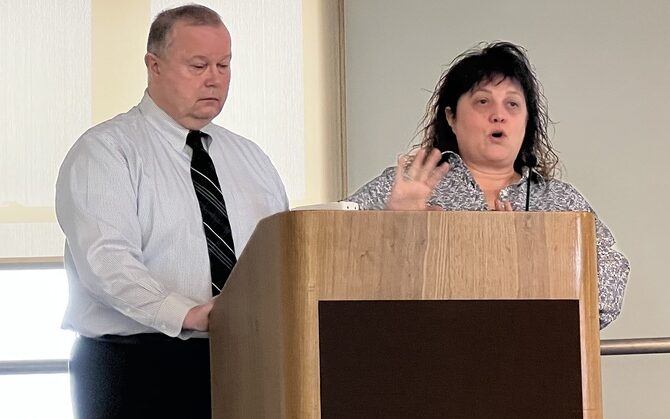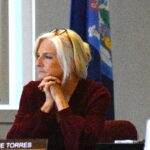
PRESQUE ISLE, Maine — Community members and recovery coaches met to discuss substance use in Aroostook County.
On April 1, The United Way hosted a substance use symposium at the University of Maine at Presque Isle.
The event saw many speakers talk about several substance use-related topics, such as opioids in the workplace, the benefits of Narcan distribution and personal experiences. A panel of community members also spoke on the topic to discuss deconstructing stigma and how to be a good resource for people in recovery.
The morning began with Shelly and Dave Yankowski giving a presentation on how substance use has affected their lives. They had two sons, Adam and Sean, who had died due to drug overdoses within a year of each other. Now, the two share their story, and open the conversation about substance use and its effects.
“If you know someone who is suffering with substance use disorder, don’t enable them,” Shelly Yankowski said. “They will hit rock bottom long after you do. Make sure you love them unconditionally.”
Next, Joanna Russell of the Northeastern Workforce Development Board spoke about what it means to be a recovery-friendly employer. Russell said that substance use disorder is more common in the workplace than many might think, and that employers can play critical roles in one’s path to recovery.
“Employers can play a special role in highlighting recovery and encouraging all people impacted by SUD,” Russell said. “This can both increase the likelihood that people get treatment sooner and create a safer, more effective work environment for everyone affected by SUD.”

Members of the drug use symposium panel in Presque Isle on April 1 include, from left, Erik Lamoreau, Michael Gahagan, John Thyng, Judy Dionne, Trudy Rairdon and Lorraine Chamberlain. (David DiMinno | The Star-Herald)
Following Russell was Denise Smith, who is a tier one Naloxone distributor for Aroostook Break. Smith busted some common myths regarding Naloxone use and distribution, as well as discussing the benefits of being a Naloxone carrier. In her presentation, Smith revealed that in 2021, Maine saw 632 fatal overdoses, but also 8,898 non-fatal overdoses, in part due to Naloxone being used to save lives.
After a short break, the event continued with a panel discussion facilitated by Chris Carroll. The panel consisted of Erik Lamoreau, project coordinator at AMHC, Caribou Police Chief Michael Gahagan, John Thyng, medical director at AR Gould Emergency Department, Judy Dionne, human resources at Twin Rivers Paper Co., Trudy Rairdon from Houlton Regional Hospital and Lorraine Chamberlain, program director at AMHC.
Carroll led a discussion on a number of different topics with the panel, including what it means to be a recovery-friendly employer, and what that looks like in the workplace. The panel also spoke on Narcan distribution, where Chief Gahagan said that he has changed his perspective on the topic. Every law enforcement agency in Aroostook now has Narcan in order to help save more lives from overdoses.
The panel discussed the need for greater access to recovery resources in Aroostook County. When people suffering from substance use disorder finally have the revelation that they want to change, it hardly ever comes at a “convenient time.” The group also talked about the need for more around-the-clock resources that those who are struggling can turn to in order to get help.
Maine’s Director of Opioid Response Gordon Smith closed out the morning by looking at Maine’s 2021 opioid responses accomplishments, as well as the initiatives for 2022. Smith reported that overdose deaths are still increasing despite community efforts, showing a 23 percent increase in deaths in 2021 over 2020. There was also an estimated 77 percent increase in Fentanyl present in drug mixtures. However, because of increased Naloxone distribution, 93 percent of overdose victims are saved.
Smith has many goals he hopes to accomplish in 2022. Smith hopes to open a crisis center in Cumberland County, launch and advertise a real time service locator tool, create an overdose fatality review panel and continue making improvements to the Prescription Monitoring Program and related interventions.
Smith closed with advice about what people can do to help, mirroring earlier presentations. Language, and how people talk about substance use disorder, is a key part of breaking down existing stigmas.
He also recommended volunteering in a recovery center, learning how to use Narcan if needed and encouraging more recovery-friendly workplaces and communities.







